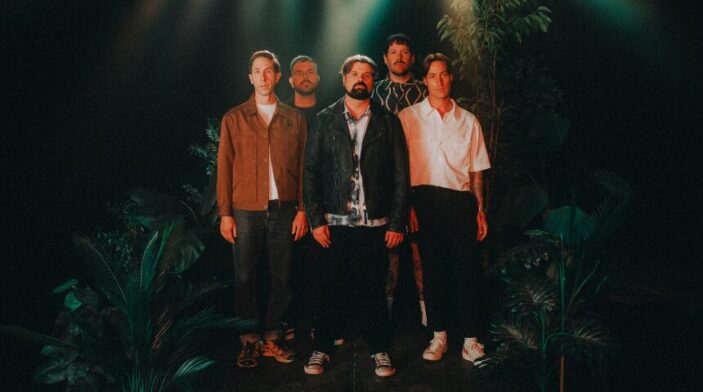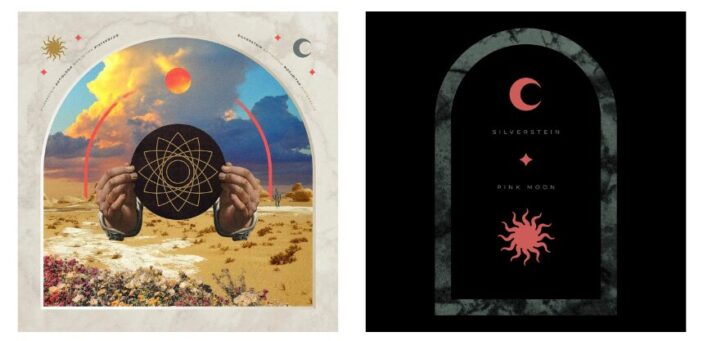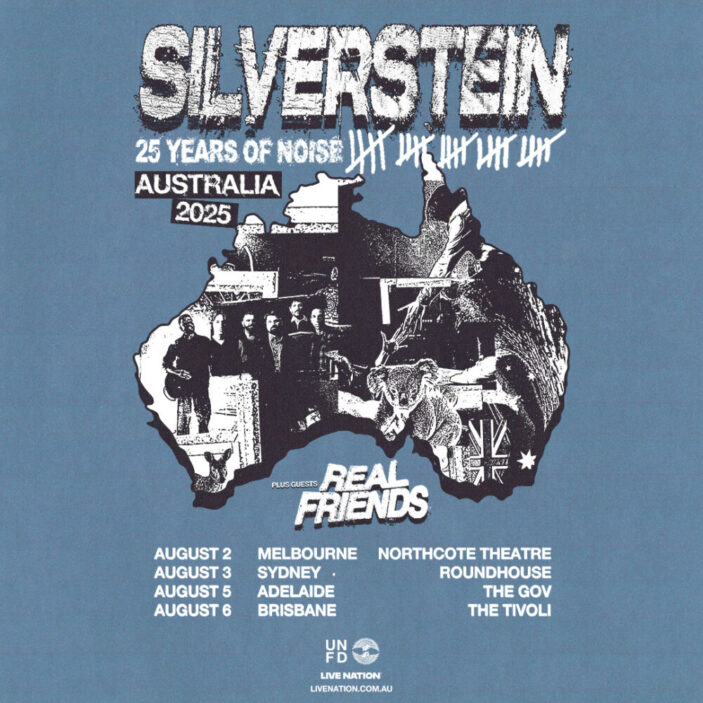
For over two decades, Canadians Silverstein have been a driving force in the post-hardcore scene, delivering emotionally charged music that continues to resonate with fans around the world.
From their breakout record When Broken Is Easily Fixed to genre-defining albums like This Is How the Wind Shifts, Silverstein has remained true to the raw emotion and explosive energy that first captured fans’ hearts. With new album Antibloom dropping earlier this year and the upcoming Pink Moon set for release in late 2025, Silverstein shows no signs of slowing down. Later this year, they’ll be bringing their 25 Years of Noise tour to Australia, returning to a country that holds a special place in the band’s heart.
We spoke with lead singer Shane Told, the unmistakable voice behind Silverstein, who took us back to where it all began—crazy nights in gritty Toronto rock bars, and the journey that’s kept them going strong for a quarter of a century.
I lived in Toronto (Canada) back in 2004 and I practically lived at Velvet Underground and The Bovine on Queen Street West! The Bovine threw me a farewell party when I came back to Australia, that’s how often I was there, so if you went to those places in 2004, chances are we crossed paths.
Wow, they’ve never threw me a party! I’ve had some wild nights at The Bovine and I saw some things! I live in Las Vegas now, and they have the punk rock museum here, and they actually have the door from The Bovine there. It’s really cool, I loved that scene and seeing all the bands playing on that strip, it was an amazing time and place for young bands.
2004-2005 were the early formative years of the band coming together. I’m really interested in how you got into music, what inspired you to pick up an instrument and really go for it?
I love that question! For me, I think early on in my life, I was really drawn to music. My parents would put on records, some of the earliest ones I remember were KISS Dynasty. My sister had a KISS record, and she also had Michael Jackson’s Thriller. Those were two of the first albums I really remember listening to and connecting with. I think there are cassette tapes somewhere of me singing those songs before I could even really talk.
My mom was always playing stuff like Led Zeppelin and Jimi Hendrix, and I was just really into whatever was on the radio. I’d tape songs off the radio all the time but it wasn’t really until I heard Metallica, when I was about ten years old—that something clicked in a totally different way.
My sister, who’s seven years older than me, was in her last year of high school at the time. She’d always go into her room, crank up her music, and dance. I wasn’t really allowed in there, but one day I heard her playing Metallica, and it just hit me. It was like the music spoke to me in a way nothing else ever had. I remember hearing the …And Justice for All album, especially the song One, and feeling like I had déjà vu, like I had already heard it before. It was surreal. Then when the Black Album came out, I remember sneaking into her room when she was out. I put the CD on and it was like I already knew the music, I could anticipate what was coming next, even though I’d never heard it before. At that age, I didn’t even really know what déjà vu was, but I described that feeling to my mom. I just said, “This music speaks to me.”
I remember talking to my sister about One, asking, “What is that sound? Is it guitar? Is it drums?” I didn’t even know. And she said, “I think it’s guitar.” That’s when I said, “I’ve gotta get a guitar.”
My dad actually played guitar too, but he had sold his electric ones and only had acoustics, which felt kind of boring to me at the time so I got an electric guitar from a Sears outlet store for $25, and I started taking lessons. From there, I just got more and more into it. The music got heavier, faster, I needed more. Then I needed to start writing my own songs, forming bands… and now, here I am, 30 or 35 years later.
It’s pretty amazing to get to do what you love and to reach a level of success where your music is heard around the world. So it all worked out!
And, you know, it was never my plan. I hear people all the time saying in interviews: “Yeah, I always knew I was destined to do this,” and “I knew I was going to be a musician,” or “I knew I was going to be a singer,” and “I told my teachers, fuck you, I’m going to be famous.” Not me. Not at all.
I did good in school. I just “Ah, music’s just for fun. It’s not going to be anything professional.” I went to university, and I took science and I thought that was going to be my path. I never thought it was going to be music until many years later. We’d been doing the band for a long time, and then I thought, “You know what? This might be my foreseeable future.” And here we are, 25 years later.
That must have been surreal, starting to climb the charts around the world and going on your first overseas tours.
I just thought, wow. Wow. I can’t believe this is happening.
I remember the first time we came to Australia specifically. The flight from Toronto to Brisbane where we played our first show, is so far and you’re just in such a different world. I remember thinking, “There’s no way people are going to know us here.”
We were like, “Well, we’ll take the free trip. Cool.” We kind of thought we were pulling the wool over everybody’s eyes, to be honest. And then they told us the first show was sold out.
Those shows felt so massive at the time, they were massive for us! I don’t know how many people it was—maybe 500? That was a really good crowd for us at the time.
I was at your Sydney show at the Annandale Hotel, and it was packed to the rafters, it was so much fun!
We were just floored that everybody knew the words to these songs. We were like, “I guess you can buy our records here? It was really cool. And then after Australia we started seeing that in Europe and in other places around the world, and things just kept growing.
But that first time in Australia, I’ll never forget how welcome we felt and just how the fans were so excited, just going absolutely bonkers.
Your early iconic songs such as “My Heroine” and “Smile in your Sleep”, do you relate to those in the same way you did when you wrote them or have they changed into something different with age, wisdom and time?
It’s funny, because those two songs are both ones that aren’t really about me. They’re not overly personal. “My Heroine”, I wrote that about a friend of mine who was going through something. And “Smiling in Your Sleep”, I wrote that about a dream I had so they’re not “This is what’s going on in my life,” time-stamp kind of songs.
But a song from that era that definitely still resonates with me is “Call It Karma”. Lyrically, at the time, I felt like I was really putting myself out there. I was honest about where I was in my life, how I felt, and who I wrote the song about. She’s actually passed away now, so I’m getting a little emotional. But that song still really speaks to where I was at that time and how I felt. I think it serves as a good reminder of that time.
I think that song helps me make better decisions sometimes. It kind of helps me through my own stuff at times. That’s kind of cool, when you can look back, maybe you haven’t read the lyrics in a while. It’s weird, you can sing them on stage, but you don’t always think about them the same way you would if you read them or really reflected on them.
But “Call it Karma” definitely means a lot. There aren’t too many songs where I don’t still feel the same way I did when I wrote them but “Call It Karma”, that’s definitely a very special song for me.
I often wonder how musicians feel when they write something really personal about something quite painful, then people love it, and they have to perform it every night for the next 20 years.
There are a couple songs that I think about live that I actually think about the lyrics.
There’s one we’re playing now, “Aquamarine” for the first time as a full band. We’ve done it acoustically before, but now we’re playing it full band, and I think that’s part of why I’m more aware of the lyrics. I still think about the lyrics every time we play it. I’ve even forgotten the words a couple times because I started thinking about them too much.
Some songs you play so much that the lyrics start to become just sounds. They kind of turn into mouth sounds, you’re just trying to hit the right notes. You don’t really hear them or feel them the same way after a while.
But occasionally, maybe I’ll have a bad day, or something will happen in my life, then all of a sudden, some lyric will hit differently.
There’s a newer song we’re playing called “Skin and Bones” and that’s another one where the lyrics strike me often.
You’ve had two albums worth of songs and material that you’re releasing this year. What caused the flood of inspiration?
It was just flowing, I can’t explain it, but you don’t question it, you just ride the wave and hope that the songs come out the way you imagine them when the ideas first come to you.
We went to the studio just planning on making one album of 12 but we had around 25 written. And when I say written, I mean done, we had already weeded out the bad ones.
We were thinking, “What are we going to do? We’re going to have to cut more than half of these songs.” And it was kind of heartbreaking.
We ended up having the idea to do two records which is Antibloom (out now) and Pink Moon and spread them out over the whole year, keeping the singles coming, which is a great idea from a marketing standpoint, but really, it was because we had so many songs, and we just couldn’t part with them.
It was really, really heartbreaking even just to cut nine so I can’t even imagine if we’d had to cut 13 or 14. It really worked out great because I love both of these albums so much. I think they’re two of the best we’ve done.

You’re about to hit the road with your 25 Years of Noise Tour and you’ll be adding the new material to the shows. What do you do to get prepared for the shows that might be a little different to what you did 25 years ago when you first started.
I think we prepare a lot more now, like, we really prepare. Whereas in the past, it was “Okay, here we are. Let’s go, get on stage.”
Now, it feels like there’s so much more intention behind everything. We’ve got this intro video that we made—it’s me talking over a slideshow of our entire career. We’ve got video assets, screens, lights… there’s just so much more to the show than, “Here we are.”
It’s no longer deciding what songs to play an hour before the show, everything is mapped out and fine-tuned.
For me personally, I even warm up differently now. I’ll set up a microphone right here in my studio and go through the show. My girlfriend’s downstairs probably wondering what the hell I’m doing, hooting and hollering, jumping around, the house creaking and everything.
But that’s something I never used to do. Now, more and more, we’re just taking it all more seriously and putting in even more work and it really feels like it’s paying off.
We’ve seen your music evolving, but you still sound so unmistakably Silverstein. How do you achieve creative growth and still manage to be exactly who the fans have come to love?
It’s a blessing and a curse that when I sing on something, it just sounds like Silverstein, no matter what.
We’ve written stuff that, instrumentally, felt really weird or quite odd and different, but then I sing on it, and everyone’s like, “Yep, that sounds like Silverstein.” I just seems to be that I have my own thing going on.
We work really hard on writing, and I say this a lot, but it’s true, records don’t get easier to make., songs don’t get easier to write.
We’ve written a lot of songs, and I’ve said a lot of things. Sometimes I’ll ask myself, “Have I said that before?” I know I’ve used that line, or I’ve made that analogy or metaphor. I’ll actually have to Google it to check. “Wait, did I put that in a song? I know I used it but did it actually make the cut?”
When you’re interviewing other lead singers [for podcast Lead Singer Syndrome], has it given you a kindred-spirit sense of community?
Oh yeah, it’s awesome, because hearing people’s stories and how much they resonate with my own, it always makes me feel more confident in who I am and what I do.
Here’s the thing I’ve realised: no one is a lead singer. I’m not. I was a guitar player. I heard Metallica, and I wanted to do the thing. I thought the thing was guitar, kind of drums too but I just wanted to do the thing. And I did.
Then guess what? I was the only person in the room who could kind of carry a tune, so I became the singer of my first band… and then I became the singer of this band.
And you wouldn’t believe it, of the 400 people I’ve talked to, I’d say 370 of them were guitar players or drummers or something else and they just fell into it.
Morale of the story… if you want to be a lead singer? Don’t try to be a lead singer. Plan B your way into it.
What is your favourite question when you sit down for these interviews?
I think asking people about how they grew up, what their family structure was like, what music was like in their household, I think that’s always interesting. There’s always a story there. Sometimes you get something really unique, but even if it’s not, they’ll always bring up certain artists or bands or songs, and you can see their eyes light up when they talk about that early stuff.
It really gives people listening to your interview a better sense of who that person really is. Because now, sure, they’re this big persona, this rock star but everybody started out as a kid, hearing music for the first time and I think tapping into that is really powerful.
You’ve got your side project River Oaks that’s been quiet for the past few years– could that be where the other 9 songs go?
Those are definitely Silverstein songs. When I think about River Oaks, songs just feel a little different, a little separate, you know and I think, when the time comes, I’ll have different things to say. I’m sure I’ll do more stuff on my own at some point but right now, we’re really focused on celebrating 25 years of the band and just kicking ass every night!
Silverstein’s Antibloom is out now on all streaming platforms. Keep an ear out for Pink Moon later this year!

Silverstein – 25 Years of Noise Australia Tour 2025 w/ Real Friends
- Saturday August 2nd – Northcore Theatre, Melbourne
- Sunday August 3rd – Roundhouse, Sydney
- Tuesday August 5th – The Gov, Adelaide
- Wednesday August 6th – The Tivoli, Brisbane
Grab your tickets HERE.
Header image: Wyatt Clough
